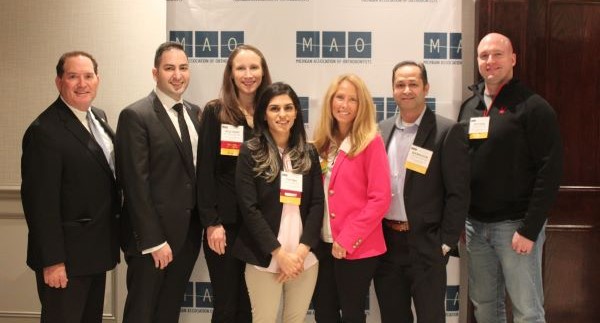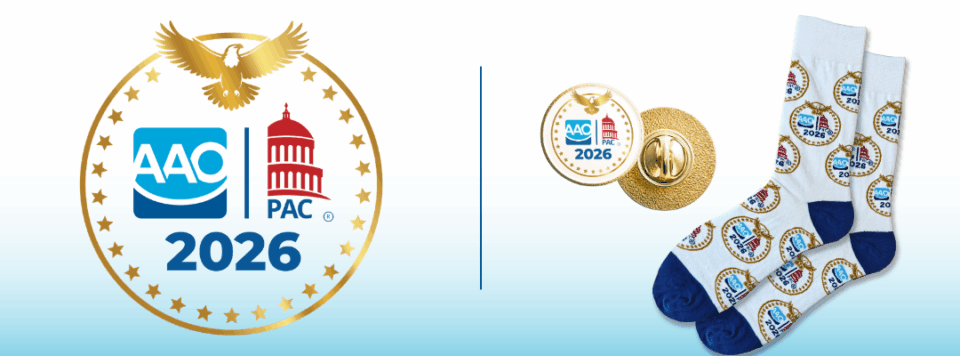The State of Michigan Joint Committee on Administrative Rules officially approved the Board- approved changes to the Dental Practice Act to allow unregistered dental assistants in the state to perform certain orthodontic tasks under direct supervision. The Board of Dentistry approved the proposed rules last October. The rules are now in effect.
The Michigan Board of Dentistry actively proposed changes to its Dentistry General Rules during the summer of 2022, which include delegable tasks to dental auxiliaries.
In August 2022 during the rulemaking process, Michigan Association of Orthodontists leaders (pictured) and nearly 60 MAO members joined forces with the AAO on a grassroots effort to submit public comments to the Michigan Board of Dentistry. The Michigan orthodontists’ input addressed their workforce shortage challenges and recommended specific updates to the Dentistry General Rules in Michigan.
“These delegation updates will make practicing orthodontics in Michigan more effective and efficient while ensuring patient health,” said 2022-2023 MAO President Dr. Nathan Thomas. “This is a big win for our specialty and association. This success shows what we can do when members are involved and engaged to make change happen for orthodontists, our patients, and our practices. “
The approved changes clarify that individuals formerly identified as dental assistants or on-the-job-trained assistants are now referred to as unregistered dental auxiliaries or UDAs. Other changes include changing supervision levels for certain tasks; providing guidance for UDAs to be trained to perform certain orthodontic duties; and adding and deleting certain duties.
UDAs under direct supervision can now remove orthodontic bands, brackets, and adhesives with hand instruments and can perform additional tasks after successfully completing in-person or virtual training, with performance evaluations on relevant functions (see below).
Additional Tasks That UDAs Can Perform Following Training
After successfully completing an in-person or virtual training with performance evaluations on relevant functions, under direct supervision, UDAs can:
- Polish assigned teeth with a slow-speed rotary handpiece immediately before an acid-etch procedure
- Etch and place adhesives before placement of orthodontic brackets and attachments for aligners
- Cement orthodontic bands or initial placements of orthodontic brackets and attachments for aligners
- Provide nutritional counseling for oral health maintenance
- Inspect and char the oral cavity using a mouth mirror and radiographs including the classifying of occlusion
- Apply anticariogenic agents including, but not limited to, sealants, fluoride varnish, and fluoride applications, but UDAs may not place sealants
- Temporarily cement and remove temporary crowns and bands
- Take impressions for intraoral appliances including bite registrations
View the full Michigan rules and training requirements here.
These modifications to the current Dentistry General Rules will help address workforce challenges while also enhancing access of patient care to specialty services. Many AAO member practices throughout the U.S. have reported difficulty in hiring a sufficient number of staff for their offices over the past two years. In 2021 the AAO developed a Workforce Shortage Task Force* to explore and create a plan to address orthodontic staffing challenges. Thus far, the successful advocacy initiative in Michigan has also served as a template for ongoing advocacy work related to workforce solutions for orthodontists in California, New York, and Ontario.
Special thanks to Dr. John Monticello, Dr. Nathan Thomas, Dr. Fatima Ahmed, Dr. Brandon Shoukri, MAO Executive Director Matt Solak, MAO local lobbyist, Kevin McKinny, and MAO members for their important contributions to this advocacy priority focused on workforce issues. Grassroots advocacy outreach makes a difference, and this Michigan example demonstrates the power of AAO advocacy working with AAO members locally to help advance our policy priorities.
Our AAOPAC helps fuel advocacy success not only in Washington, D.C. but in states across the country as well. Consider sharing your support now by contributing at AAOPAC.org.
* View resources developed by the Workforce Shortage Task Force here.



